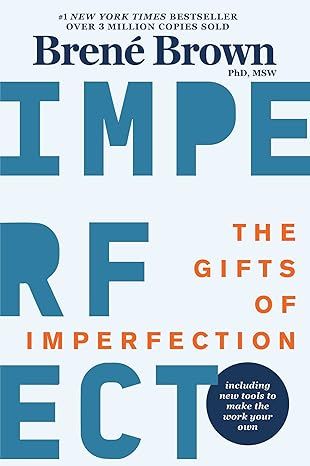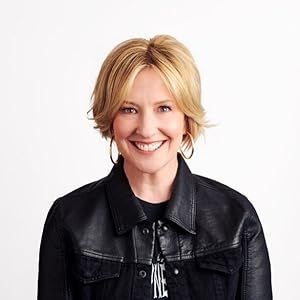The Gifts of Imperfection: 10th Anniversary Edition: Features a new foreword and brand-new toolsAudio CD
4.7
-
42,318 ratings
NEW YORK TIMES BESTSELLER • This tenth-anniversary edition of the game-changing #1 New York Times bestseller features a new foreword and new tools to make the work your own.
For over a decade, Brené Brown has found a special place in our hearts as a gifted mapmaker and a fellow traveler. She is both a social scientist and a kitchen-table friend whom you can always count on to tell the truth, make you laugh, and, on occasion, cry with you. And what’s now become a movement all started with The Gifts of Imperfection, which has sold more than two million copies in thirty-five different languages across the globe. What transforms this book from words on a page to effective daily practices are the ten guideposts to wholehearted living. The guideposts not only help us understand the practices that will allow us to change our lives and families, they also walk us through the unattainable and sabotaging expectations that get in the way. Brené writes, “This book is an invitation to join a wholehearted revolution. A small, quiet, grassroots movement that starts with each of us saying, ‘My story matters because I matter.’ Revolution might sound a little dramatic, but in this world, choosing authenticity and worthiness is an absolute act of resistance.”
Kindle
$12.99
Available instantly
Audiobook
$0.99
with membership trial
Hardcover
$13.15
Paperback
$9.87
Ships from
Amazon.com
Payment
Secure transaction
ISBN-10
1616499605
ISBN-13
978-1616499600
Print length
208 pages
Language
English
Publisher
Hazelden Publishing
Publication date
February 28, 2022
Dimensions
5.38 x 0.8 x 8.38 inches
Item weight
9.6 ounces
Popular Highlights in this book
Authenticity is the daily practice of letting go of who we think we’re supposed to be and embracing who we are.
Highlighted by 42,147 Kindle readers
If we want to fully experience love and belonging, we must believe that we are worthy of love and belonging.
Highlighted by 38,089 Kindle readers
Shame needs three things to grow out of control in our lives: secrecy, silence, and judgment.
Highlighted by 31,703 Kindle readers
Product details
ASIN :
B00BS03LL6
File size :
1202 KB
Text-to-speech :
Enabled
Screen reader :
Supported
Enhanced typesetting :
Enabled
X-Ray :
Enabled
Word wise :
Enabled
Editorial reviews
About the Author
Dr. Brené Brown is a research professor at the University of Houston, where she holds the Huffington Foundation Endowed Chair at the Graduate College of Social Work. She also holds the position of visiting professor in management at the University of Texas at Austin McCombs School of Business.
Brené has spent the past two decades studying courage, vulnerability, shame, and empathy. She is the author of six #1 New York Times best sellers and is the host of two award-winning podcasts, Unlocking Us and Dare to Lead.
Brené’s books have been translated into more than 30 languages, and her titles include Atlas of the Heart, Dare to Lead, Braving the Wilderness, Rising Strong, Daring Greatly, and The Gifts of Imperfection. With Tarana Burke, she co-edited the best-selling anthology You Are Your Best Thing: Vulnerability, Shame Resilience, and the Black Experience.
Brené’s TED talk on the Power of Vulnerability is one of the top five most-viewed TED talks in the world, with over 60 million views. Brené is the first researcher to have a filmed lecture on Netflix, and in March 2022, she launched a new show on HBO Max that focuses on her latest book, Atlas of the Heart.
Brené spends most of her time working in organizations around the world, helping develop braver leaders and more courageous cultures.
She lives in Houston, Texas, with her husband, Steve. They have two children, Ellen and Charlie, and a weird Bichon named Lucy.
Read more
Sample
Excerpt. © Reprinted by permission. All rights reserved.
Preface
Once you see a pattern, you can’t un-see it. Trust me, I’ve tried. But when the same truth keeps repeating itself, it’s hard to pretend that it’s just a coincidence. For example, no matter how hard I try to convince myself that I can function on six hours of sleep, anything less than eight hours leaves me impatient, anxious, and foraging for carbohydrates. It’s a pattern.I also have a terrible procrastination pattern: I always put off writing by reorganizing my entire house and spending way too much time and money buying office supplies and organizing systems. Every single time.
One reason it’s impossible to un-see trends is that our minds are engineered to seek out patterns and to assign meaning to them. Humans are a meaning-making species. And, for better or worse, my mind is actually fine-tuned to do this. I spent years training for it, and now it’s how I make my living.
As a researcher, I observe human behavior so I can identify and name the subtle connections, relationships, and patterns that help us make meaning of our thoughts, behaviors, and feelings. I love what I do. Pattern hunting is wonderful work and, in fact, throughout my career, my attempts at un-seeing were strictly reserved for my personal life and those humbling vulnerabilities that I loved to deny. That all changed in November 2006, when the research that fills these pages smacked me upside the head. For the first time in my career, I was desperate to un-see my own research.
Up until that point, I had dedicated my career to studying difficult emotions like shame, fear, and vulnerability. I had written academic pieces on shame, developed a shame-resilience curriculum for mental health and addictions professionals, and written a book about shame resilience called I Thought It Was Just Me.
In the process of collecting thousands of stories from diverse men and women who lived all over the country--ranging in age from eighteen to eighty-seven--I saw new patterns that I wanted to know more about. Yes, we all struggle with shame and the fear of not being enough. And, yes, many of us are afraid to let our true selves be seen and known. But in this huge mound of data there was also story after story of men and women who were living these amazing and inspiring lives.
I heard stories about the power of embracing imperfection and vulnerability. I learned about the inextricable connection between joy and gratitude, and how things that I take for granted, like rest and play, are as vital to our health as nutrition and exercise. These research participants trusted themselves, and they talked about authenticity and love and belonging in a way that was completely new to me.
I wanted to look at these stories as a whole, so I grabbed a file and a Sharpie and wrote the first word that came to my mind on the tab: Wholehearted. I wasn’t sure what it meant yet, but I knew that these stories were about people living and loving with their whole hearts. I had a lot of questions about Wholeheartedness. What did these folks value? How did they create all of this resilience in their lives? What were their main concerns and how did they resolve or address them? Can anyone create a Wholehearted life? What does it take to cultivate what we need? What gets in the way?
As I started analyzing the stories and looking for re-occurring themes, I realized that the patterns generally fell into one of two columns; for simplicity sake, I first labeled these Do and Don’t. The Do column was brimming with words like worthiness, rest, play, trust, faith, intuition, hope, authenticity, love, belonging, joy, gratitude, and creativity. The Don’t column was dripping with words like perfection, numbing, certainty, exhaustion, self-sufficiency, being cool, fitting in, judgment, and scarcity.
I gasped the first time I stepped back from the poster paper and took it all in. It was the worst kind of sticker shock. I remember mumbling, No. No. No. How can this be?”
Even though I wrote the lists, I was shocked to read them. When I code data, I go into deep researcher mode. My only focus is on accurately capturing what I heard in the stories. I don’t think about how I would say something, only how the research participants said it. I don’t think about what an experience would mean to me, only what it meant to the person who told me about it.
I sat in the red chair at my breakfast room table and stared at these two lists for a very long time. My eyes wandered up and down and across. I remember at one point I was actually sitting there with tears in my eyes and with my hand across my mouth, like someone had just delivered bad news.
And, in fact, it was bad news. I thought I’d find that Wholehearted people were just like me and doing all of the same things I was doing: working hard, following the rules, doing it until I got it right, always trying to know myself better, raising my kids exactly by the books...After studying tough topics like shame for a decade, I truly believed that I deserved confirmation that I was living right.” But here’s the tough lesson that I learned that day (and every day since):
How much we know and understand ourselves is critically important, but there is something that is even more essential to living a Wholehearted life: loving ourselves.
Knowledge is important, but only if we’re being kind and gentle with ourselves as we work to discover who we are. Wholeheartedness is as much about embracing our tenderness and vulnerability as it is about developing knowledge and claiming power.
And perhaps the most painful lesson of that day hit me so hard that it took my breath away: It was clear from the data that we cannot give our children what we don’t have. Where we are on our journey of living and loving with our whole hearts is a much stronger indicator of parenting success than anything we can learn from how-to books.
This journey is equal parts heart work and head work, and as I sat there on that dreary November day, it was clear to me that I was lacking in my own heart work.
I finally stood up, grabbed my marker off the table, drew a line under the Don’t list, and then wrote the word me under the line. My struggles seemed to be perfectly characterized by the sum total of the list. I folded my arms tightly across my chest, sunk deep down into my chair, and thought, This is just great. I’m living straight down the shit list.
I walked around the house for about twenty minutes trying to un-see and undo everything that had just unfolded, but I couldn’t make the words go away. I couldn’t go back, so I did the next best thing: I folded all of the poster sheets into neat squares and tucked them into a Rubbermaid tub that fit nicely under my bed, next to my Christmas wrap. I wouldn’t open that tub again until March of 2008.
Next, I got myself a really good therapist and began a year of serious soul work that would forever change my life. Diana, my therapist, and I still laugh about my first visit. Diana, who is a therapist to many therapists, started with the requisite, So what’s going on?” I pulled out the Do list and matter-of-factly said, I need more of the things on this list. Some specific tips and tools would be helpful. Nothing deep. No childhood crap or anything.”
It was a long year. I lovingly refer to it on my blog as the 2007 [Breakdown] Spiritual Awakening. It felt like a textbook breakdown to me, but Diana called it a spiritual awakening. I think we were both right. In fact, I’m starting to question if you can have one without the other. Of course, it’s not a coincidence that this unraveling happened in November 2006. The stars were perfectly aligned for a breakdown: I was raw from being newly sugar and flour free, I was days away from my birthday (always a contemplative time for me), I was burned out from work, and I was right on the cusp of my midlife unraveling.
People may call what happens at midlife a crisis,” but it’s not. It’s an unraveling--a time when you feel a desperate pull to live the life you want to live, not the one you’re supposed” to live. The unraveling is a time when you are challenged by the universe to let go of who you think you are supposed to be and to embrace who you are.
Midlife is certainly one of the great unraveling journeys, but there are others that happen to us over the course of our lives:
- marriage
- divorce
- becoming a parent
- recovery
- moving
- an empty nest
- retiring
- experiencing loss or trauma
- working in a soul-sucking jobThe universe is not short on wake-up calls. We’re just quick to hit the snooze button.
As it turned out, the work I had to do was messy and deep. I slogged through it until one day, exhausted and with mud still wet and dripping off of my traveling shoes, I realized, Oh, my God. I feel different. I feel joyful and real. I’m still afraid, but I also feel really brave. Something has changed--I can feel it in my bones.”
I was healthier, more joyful, and more grateful than I had ever felt. I felt calmer and grounded, and significantly less anxious. I had rekindled my creative life, reconnected with my family and friends in a new way, and most important, felt truly comfortable in my own skin for the first time in my life.
I learned how to worry more about how I felt and less about what people might think.” I was setting new boundaries and began to let go of my need to please, perform, and perfect. I started saying no rather than sure (and being resentful and pissed off later). I began to say Oh, hell yes!” rather than Sounds fun, but I have lots of work to do” or I’ll do that when I’m _________ (thinner, less busy, better prepared).”
As I worked through my own Wholehearted journey with Diana, I read close to forty books, including every spiritual awakening memoir I could get my hands on. They were incredibly helpful guides, but I still craved a guidebook that could offer inspiration, resources, and basically serve as a soul traveler’s companion of sorts.
One day, as I stared at the tall pile of books precariously stacked on my nightstand, it hit me! I want to tell this story in a memoir. I’ll tell the story of how a cynical, smart-ass academic became every bit of the stereotype that she spent her entire adult life ridiculing. I’ll fess up about how I became the middle-aged, recovering, health-conscious, creative, touchy-feely spirituality-seeker who spends days contemplating things like grace, love, gratitude, creativity, authenticity, and is happier than I imagined possible. I’ll call it Wholehearted.
I also remember thinking, Before I write the memoir, I need to use this research to write a guidebook on Wholehearted living! By mid-2008, I had filled three huge tubs with notebooks, journals, and mounds of data. I had also done countless hours of new research. I had everything I needed, including a passionate desire to write the book that you’re holding in your hands.
On that fateful November day when the list appeared and I sunk into the realization that I wasn’t living and loving with my whole heart, I wasn’t totally convinced. Seeing the list wasn’t enough to fully believe in it. I had to dig very deep and make the conscious choice to believe...to believe in myself and the possibility of living a different life. A lot of questioning, countless tears, and a huge collection of joyful moments later, believing has helped me see.
Read more
About the authors
Brené Brown
Dr. Brené Brown is a research professor at the University of Houston, where she holds the Huffington Foundation Endowed Chair at the Graduate College of Social Work. She also holds the position of visiting professor in management at the University of Texas at Austin McCombs School of Business.
Brené has spent the past two decades studying courage, vulnerability, shame, and empathy. She is the author of six #1 New York Times best sellers and is the host of two award-winning Spotify podcasts, Unlocking Us and Dare to Lead.
Brené’s books have been translated into more than 30 languages, and her titles include Atlas of the Heart, Dare to Lead, Braving the Wilderness, Rising Strong, Daring Greatly, and The Gifts of Imperfection. With Tarana Burke, she co-edited the best-selling anthology You Are Your Best Thing: Vulnerability, Shame Resilience, and the Black Experience.
Brené’s TED talk on the Power of Vulnerability is one of the top five most-viewed TED talks in the world, with over 50 million views. Brené is the first researcher to have a filmed lecture on Netflix, and in March 2022, she launched a new show on HBO Max that focuses on her latest book, Atlas of the Heart.
Brené spends most of her time working in organizations around the world, helping develop braver leaders and more-courageous cultures. She lives in Houston, Texas, with her husband, Steve. They have two children, Ellen and Charlie, and a weird Bichon named Lucy.
Read more
Reviews
Customer reviews
4.7 out of 5
42,318 global ratings
Jacky
5
Just as listed
Reviewed in the United States on October 14, 2024
Verified Purchase
Ordered this book for my book club. Fit exact description and in great condition. The price was very affordable. Very happy with my purchase.
Angela Risner The Sassy Orange
5
Simple to read and understand, but such a powerful, life-changing message
Reviewed in the United States on January 29, 2014
Verified Purchase
This is the first book by Brene Brown that I've read. I just happened across the title on a friend's Facebook page and thought it looked interesting. How did I live without Brene Brown in my life before?? This book falls right in line with others I've read recently (Stephen Cope's The Great Work of Your Life, Gretchen Rubin's The Happiness Project, etc.) in reaffirming that if you live your life according to "Supposed to Be," you will never be happy.
I can't possibly share all of my favorite parts (I have 31 pages of highlights), but here are a few:
•People may call what happens at midlife "a crisis," but it's not. It's an unraveling - a time when you feel a desperate pull to live the life you want to live, not the one you're "supposed' to live. The unraveling is a time when you are challenged by the universe to let go of you think you are supposed to be and to embrace who you are. •It's like walking toward a star in the sky. We never really arrive, but we certainly know that we're heading in the right direction. •Owning our story can be hard but not nearly as difficult as spending our lives running from it. Embracing our vulnerabilities is risky but not nearly as dangerous as giving up on love and belonging and joy - the experiences that make us the most vulnerable. Only when we are brave enough to explore the darkness will we discover the infinite power of our light. •Shame hates it when we reach out and tell our story. It hates having words wrapped around it - it can't survive being shared. Shame loves secrecy. The most dangerous thing to do after a shaming experience is hide or bury our story. When we bury our story, the shame metastasizes. •The root of the word courage is cor - the Latin word for heart. In one of its earliest forms, the word courage had a very different definition than it does today. Courage originally meant, "To speak one's mind by telling all one's heart." •Every time we choose courage, we make everyone around us a little better and the world is a little braver. And our world could stand to be a little kinder and braver. •The word compassion is derived from the Latin words pati and cum, meaning "to suffer with." I don't believe that compassion is our default response. I think our first response to pain - ours or someone else's - is to self-protect. We protect ourselves by looking for someone or something to blame. Or sometimes we shield ourselves by turning to judgment or by immediately going into fix-it mode. •Chodron: "Compassion is not a relationship between the healer and the wounded. It's a relationship between equals. Only when we know our own darkness well can we be present with the darkness of others. Compassion becomes real when we recognize our shared humanity." •The heart of compassion is really acceptance. The better we are at accepting ourselves and others, the more compassionate we become. Well, it's difficult to accept people when they are hurting us or taking advantage of us or walking all over us. This research has taught me that if we really want to practice compassion, we have to start by setting boundaries and holding people accountable for their behavior. •We can confront someone their behavior, or fire someone, or fail a student, or discipline a child without berating them or putting them down. The key is to separate people from their behaviors - to address what they're doing, not who they are.
Wonderful, wonderful book. Amazing revelations.
Highly recommend.
Read more
13 people found this helpful
Selene A.
5
A life changing perspective
Reviewed in the United States on August 28, 2024
Verified Purchase
This book provides a fresh perspective and a safe path to be your authentic self. I have never read a book that truly made me feel safe as I looked inward. Brene’s Way with words are funny and so relatable it pulls out the real emotion in you to seek and learn for yourself. I highly recommend this for anyone wondering the possibilities out there.
4 people found this helpful
Laura Navarrete
5
Eye Opening
Reviewed in the United States on December 11, 2017
Verified Purchase
With someone struggling with self-esteem issues since they were eight years old (I’m currently 18), the book The Gifts of Imperfection by Brene Brown helped me out so much in the aspect on how to practice self-love and knowing what my worth is. My goal was to learn how to value and love myself for who I am and how I could possibly grow from my vulnerabilities. Needless to say, the book met my goals. Brene Brown is a writer and a researcher at the University of Houston Graduate College of Social Work. She is a very intellectual author and how she had the patience to research the topics in her book such as Cultivating Authenticity and Wholehearted Living. The topics covered in this book are self-love, self-worth, connection, compassion, courage, and so many others. Brown’s goal as an author for this book was to make people realize that no matter what people said or thought about you, it was important for you to understand that you “are worthy of love and belonging now. Right this minute.” (Brown, 24.) What I loved about the book is how deep it truly is--how knowing your self-worth and how to practice self-love is a constant war that’s with you every day of your life. As I kept reading along, I definitely knew that the book filled its purpose of explaining and knowing what my worth is. It made me realize that I need to be a bit kinder to myself and silencing that annoying voice that sometimes tends to creep up on me whispering, you’re not enough and you never will be. All great books have some flaws that the reader may or may not agree with. I absolutely adored this book but, there were some things here and there that got in the way at times. Sometimes, the book may be difficult to understand what exactly the author is trying to get at like when she is trying to distinguish between shame and guilt she proceeds to state it as, “the difference between shame and guilt is best understood as the differences between “I am bad” and “I did something bad.” (Brown, 41.) This can be confusing the first time you read it, but if you take the patience to break it down and analyze it, it won’t be too challenging. The book (in general) can get a bit repetitive, but it makes sense due to the fact that all ties back together at the end. This book is astoundingly great for a person who wants to learn how to be kinder to themselves and value the gifts of imperfection that they may have. Thus, making me rate the book 4.8/5 due to its wisdom and it’s rich content of research that Brown provided. Afterall, according to Brene Brown “practicing self-love is learning how to trust ourselves, to treat ourselves with respect, and be kind and affectionate toward ourselves.” (Brown, 27).
Read more
4 people found this helpful
Alice
5
Great reminders
Reviewed in the United States on September 29, 2024
Verified Purchase
Brene’ Brown is a wonderful author who speaks with wisdom, compassion and courage in all things related to matters of the heart.
Top Brené Brown titles
View all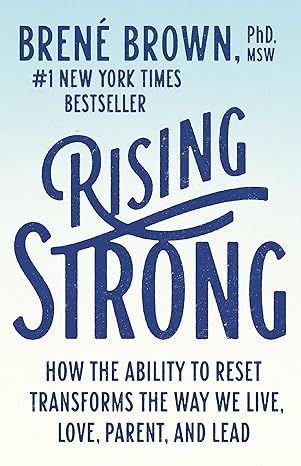
Rising Strong: How the Ability to Reset Transforms the Way We Live, Love, Parent, and Lead
4.7
-
11,216
$0.99
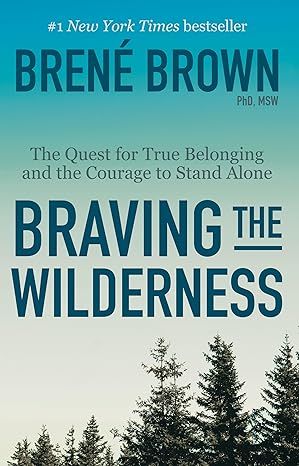
Braving the Wilderness: The Quest for True Belonging and the Courage to Stand Alone
4.6
-
14,403
$0.99
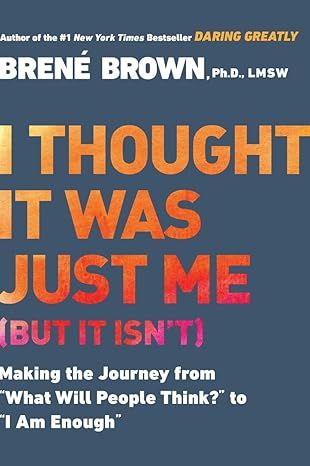
I Thought It Was Just Me (but it isn't): Making the Journey from "What Will People Think?" to "I Am Enough"
4.7
-
7,822
$0.99
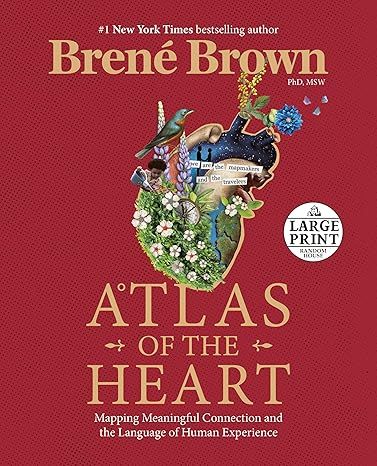
Atlas of the Heart: Mapping Meaningful Connection and the Language of Human Experience (Random House Large Print)
4.7
-
20,467
$0.99
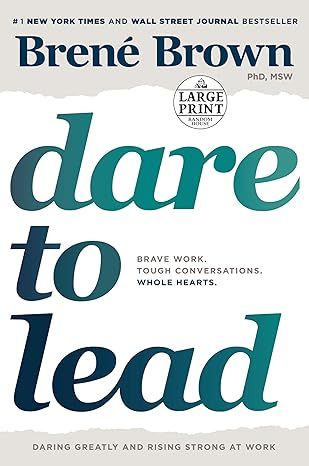
Dare to Lead: Brave Work. Tough Conversations. Whole Hearts.
4.7
-
21,212
$0.99
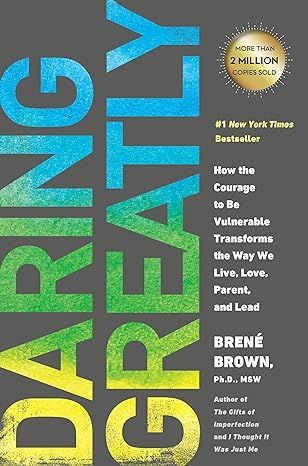
Daring Greatly: How the Courage to Be Vulnerable Transforms the Way We Live, Love, Parent, and Lead
4.7
-
30,025
$4.43
Best Sellers
View all
The Tuscan Child
4.2
-
100,022
$8.39

The Thursday Murder Club: A Novel (A Thursday Murder Club Mystery)
4.3
-
155,575
$6.33

Sapiens: A Brief History of Humankind
4.6
-
140,302
$13.49

The Butterfly Garden (The Collector, 1)
4.3
-
88,556
$9.59

Things We Hide from the Light (Knockemout Series, 2)
4.4
-
94,890
$11.66

The Last Thing He Told Me: A Novel
4.3
-
154,085
$2.99

The Perfect Marriage: A Completely Gripping Psychological Suspense
4.3
-
143,196
$9.47

The Coworker
4.1
-
80,003
$13.48

First Lie Wins: A Novel (Random House Large Print)
4.3
-
54,062
$14.99

Mile High (Windy City Series Book 1)
4.4
-
59,745
$16.19

Layla
4.2
-
107,613
$8.99

The Locked Door
4.4
-
94,673
$8.53
